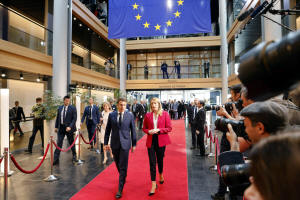Europeans want fairer, greener, more agile EU - report
 Send a link to a friend
Send a link to a friend
 [May 09, 2022]
By Jan Strupczewski [May 09, 2022]
By Jan Strupczewski
BRUSSELS (Reuters) - European Union
citizens would like the 27-nation bloc to become fairer, show greater
solidarity, lead the fight against climate change and make swifter
decisions, even if it means scrapping the need for unanimity on some
issues, an EU report showed.
The report is the result of a year of consultations with citizens by EU
institutions, a process called the Conference on the Future of Europe,
and it spells out ideas for change, some of which might require amending
EU treaties - a highly sensitive topic.
The 49 proposals will now be examined by the European Parliament, EU
governments and the European Commission, the latter the only one able to
propose new EU laws.
"We call on you to look at these proposals as a whole, to implement
them, and not just the ones that suit you the most and are easily
implemented. Do it transparently," the report's authors said in a direct
appeal to the institutions.

The proposals listed in the report span nine themes: climate change and
environment, the economy, migration, digital transformation, democracy,
education, values and the rule of law, health, and the position of the
EU in the world.
They are aimed at ending discrimination for all Europeans across the
27-nation bloc and urge it to be "bold and act fast" to become an
environment and climate leader, by encouraging sustainable transport and
becoming "a truly circular economy".
[to top of second column]
|

European Parliament president Roberta Metsola and France's President
Emmanuel Macron arrive at the EU Parliament before attending the
closing session of the Conference on the Future of Europe and the
release of its report with proposals for reform, in Strasbourg,
France May 9, 2022. Ludovic Marin/Pool via REUTERS

Crucially the report calls for the EU to remove the
principle of unanimity in EU decisions which now exists in areas of
foreign and security policy, taxes, EU finances, some areas of
justice and home affairs and social security and protection.
The requirement for unanimity has often been criticised as either
substantially slowing or even blocking the EU's development, as all
decisions in these areas have to be reduced to the lowest common
denominator.
Such changes would require amendments to the EU treaties, which
would be a long and difficult process and would in itself require
unanimity.
Many EU countries believe that with the bloc facing post-pandemic
economic struggles, the effects of Russia's invasion of Ukraine and
climate change, a lengthy process of treaty change now would only
draw away resources from tackling the more urgent issues and create
new divisions.
(Reporting by Jan Strupczewski; editing by Philip Blenkinsop and
Hugh Lawson)
[© 2022 Thomson Reuters. All rights
reserved.]
This material may not be published,
broadcast, rewritten or redistributed.
Thompson Reuters is solely responsible for this content. |